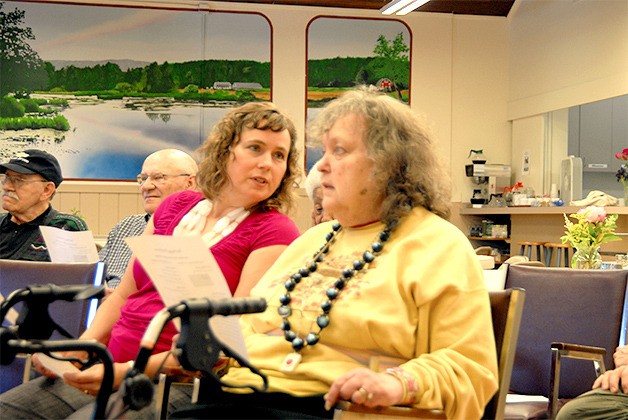What Amara Oden does shouldn’t really be called work. It’s more of a calling for the Carnation woman, and has been for most of her life.
“I’ve always worked in the non-profit field,” she says, looking back through, and beyond, her seven years as the Sno-Valley Senior Center’s executive director. Although she’s leaving the center this month, she will still be working with non-profits, and doing more of what originally led her into the field.
“One of the times I felt most alive and connected to my work is … in the thick of a group, working together, when people are all committed and working on some kind of issue,” she said. “I just love that energy.”
Oden has guided the center through a few challenges, including a seven-month facilities renovation in the fall and winter of 2011-12, and a start on the path to a new funding model. When she started at the center in 2007, Re-in-Carnation, the affiliated thrift store on the same block, was just a gleam in one board member’s eye.
“We had a board member, dear Fran (Carlson), who’s since passed away, who always wanted to do a thrift store,” Oden said. The center owned a rental property right next door, “and she had an idea that it could work as a thrift store.”
The plan was always to staff it with volunteers and use the shop profits to support the center, but the store idea took commitment, a lot of work, and a surprising amount of cash to become a retail reality.
“One of the scariest things was all the money we had to pour into it to get it up to code as a store!” Oden recalled.
“I remember writing check after check after check… and my heart was just in the pit of my stomach. I remember saying to Fran, ‘I hope this pays off!’”
It has, and for years. After its initial investment of about $60,000, the center has been receiving almost that same amount back each year in revenue from Re-in-Carnation, almost 10 percent of its annual $600,000 budget.
Grant funding covered the other really big checks Oden had to write, for the long-awaited senior center renovation, begun in the fall of 2011. Over seven months, the 119-year-old building was updated top to bottom, with a storage addition, a new heat pump, fire sprinklers, and new programming rooms and facilities on the second floor. During the work, the center relocated most of its programming to Camp Don Bosco, two miles south of the city. It was a challenge for staff, volunteers, and guests, but a majority of them agreed that the results were entirely worth the wait when they returned to the center in April 2012.
Since then, new windows and siding were added, and the “final funded phase” of the center’s remodel begins soon, Oden said. The upcoming project will expand the Adult Day Health program, which was threatened with closure last fall, for lack of funding and low enrollment. What saved the program were concerted efforts from staff and volunteers to raise funds both in the short term with events like the successful community prom, and for the future through individual subscriptions and more sustainable funding sources.
“We love events at the senior center,” said Oden. “They’re important for us because they (serve the community). But it’s an exhausting and unpredictable way to raise all of your money. All of it.”
Fundraising
Most of the center’s revenue has historically come from community events like its monthly steak dinners, Fourth of July feeds and individual programs. Oden also contributed some funding when she did her own event, her first-ever Olympic triathlon in 2009, raising more than $5,000 for center programs. It was mainly through the strength of the center programs that the center flourished, enough to help the Adult Day Health program of support and care for frail adults out of its $30,000 year-end deficit in 2012. The following year, though, the general fund no longer had a surplus, and the center used emergency reserves to keep its own budget out of the red; the ADH program again fell short.
The center needed to restructure its finances, top to bottom, and so the board looked at everything, from program fees to individual support. It was a difficult, “painful” transition, Oden said. “When you have all these well-meaning people…. we want to provide everything for free,” she said. “But you have to pay for the shell that contains all these great things, too,” she said.
To do that, she said, the board looked at restructuring its fee and instructor payment systems, to keep them sustainable, and they reluctantly agreed to ask for direct support from people in the community.
“They didn’t want to be seen as sending out a letter every month,” Oden explained.
While she understood their struggle, Oden also says she loves fundraising for non-profits.
“I don’t see it as annoying sales,” she said, “I see it as a partnership… it taps into the desire of a community to see something happen.”
Oden will bring that approach to her new business, Amara Oden Consulting, where she will focus on helping non-profit organizations with board development, training, and, of course, fundraising.
She also plans to go back to school for a master’s degree in divinity. She’s not sure how it will fit into her life with husband Leif, who she met while leading an outreach trip for Rite of Passage Journeys, and their three children, but she knows she has to try it.
“Being the minister of a church is an idea that took hold of me 10 years ago,” she said. “It doesn’t make any logical sense from a family perspective, from a financial perspective, but since I can’t shake it after 10 years, it’s time to pay attention.”


